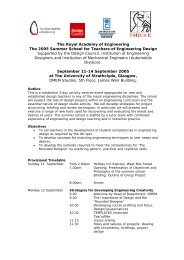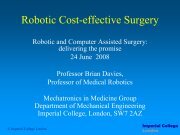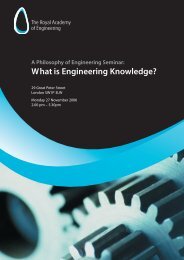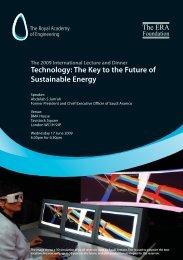Lecture Series in Mobile Telecommunications and Networks (1583KB)
Lecture Series in Mobile Telecommunications and Networks (1583KB)
Lecture Series in Mobile Telecommunications and Networks (1583KB)
You also want an ePaper? Increase the reach of your titles
YUMPU automatically turns print PDFs into web optimized ePapers that Google loves.
From pla<strong>in</strong> old Telephony to flawless mobile audio communication<br />
b<strong>and</strong>width extension module at the transmitter side will do the job. However, there is still much work to do <strong>and</strong> the<br />
listen<strong>in</strong>g tests have to be done on a broad basis.<br />
Perhaps I could just add a further comment to the last question. If we are mov<strong>in</strong>g towards UMTS LTE, <strong>and</strong> we are<br />
allowed to <strong>in</strong>crease somewhat the bit rate, then the codecs will become more <strong>and</strong> more transparent to any k<strong>in</strong>d of<br />
strange dialect.<br />
Andy Evans (Cable & Wireless EAUS): I just wondered how much <strong>in</strong>terest there is <strong>in</strong> the st<strong>and</strong>ards forums <strong>in</strong> actually<br />
adopt<strong>in</strong>g these different codecs <strong>in</strong> future mobile st<strong>and</strong>ards – particularly LTE?<br />
Peter Vary: As far as I underst<strong>and</strong> it – <strong>and</strong> I guess Mike can comment on that – one of the ma<strong>in</strong> reasons for the NGMN<br />
<strong>in</strong>itiative is that there are too many st<strong>and</strong>ards <strong>and</strong> that the operators are surprised that there are the solutions A, B, C<br />
<strong>and</strong> D <strong>and</strong> you have to implement them all <strong>and</strong> then you will see on the market whether it is a good solution or not,<br />
<strong>and</strong> whether it is taken or not. The operators try to steer the st<strong>and</strong>ardisation <strong>and</strong> to settle all the critical issues, <strong>in</strong>clud<strong>in</strong>g<br />
the IPR method, before the st<strong>and</strong>ard is written.<br />
Michael Walker: I can add to that. One of the big costs <strong>in</strong> the bus<strong>in</strong>ess is that, because of the st<strong>and</strong>ardisation process,<br />
you often have multiple solutions for the same problem. All those solutions get implemented <strong>in</strong> the equipment <strong>and</strong><br />
that is a waste of the resource. If we are go<strong>in</strong>g to see technologies like this, which could actually offer the user much<br />
more benefit, hav<strong>in</strong>g multiple choices for basic functionality, then we have to resolve that problem.<br />
Dr Tim Moulsley (HJM Ltd): I am an <strong>in</strong>dependent consultant but formerly I was with Philips.<br />
Peter Vary: Yes, you were a colleague of m<strong>in</strong>e.<br />
Tim Moulsley: Just pick<strong>in</strong>g up the po<strong>in</strong>t we are on now, which is look<strong>in</strong>g at the st<strong>and</strong>ards for codecs, I wonder how<br />
the take-over of an all-IP network, both <strong>in</strong> fixed <strong>and</strong> <strong>in</strong> mobile, will affect this k<strong>in</strong>d of debate. That would tend to push<br />
the codec to the application level, where there is much more flexibility about which codec st<strong>and</strong>ard you actually have,<br />
than if it is <strong>in</strong> as part of the wireless network or part of the telecoms network itself. Would you like to comment on that?<br />
Peter Vary: My impression is that voice-over IP is actually the driv<strong>in</strong>g force to <strong>in</strong>troduce wideb<strong>and</strong> <strong>in</strong> cellular. The po<strong>in</strong>t<br />
is that no one has the chance to listen to a phone <strong>in</strong> the shop. If you go to a shop to buy a telephone, you have no idea<br />
<strong>and</strong> you don’t th<strong>in</strong>k that it makes any sense to listen to the quality – because a phone has a certa<strong>in</strong> quality <strong>and</strong> it is a<br />
phone.<br />
Now, however, we see some experienced users hav<strong>in</strong>g voice-over IP communication. Voice-over IP can be significantly<br />
worse or sometimes much better. Many th<strong>in</strong>gs are go<strong>in</strong>g on there. We have Skype <strong>and</strong> we have SIP telephones.<br />
We have the evolution of cordless telephones, the DECT telephones. They have now decided to implemented<br />
wideb<strong>and</strong> the codec <strong>and</strong> you can buy DECT telephones which have two connections to networks – one traditional<br />
network, the telephone network, <strong>and</strong> one to the DSL router at your home. If you connect it to the DSL router, you have<br />
wideb<strong>and</strong> speech with excellent quality.<br />
You have greater flexibility <strong>in</strong> voice-over IP <strong>and</strong> this will sort out which codecs will survive. There is also a debate<br />
between the mobile community <strong>and</strong> the IP community – that is, ITU on one side <strong>and</strong> 3GPP – as to whether we should<br />
use a universal codec <strong>in</strong> future <strong>in</strong> both fixed <strong>and</strong> wireless networks. There is some hope because they are talk<strong>in</strong>g to<br />
each other to get the same codec under a 3GPP number <strong>and</strong> under an ITU number. Some voice-over IP operators are<br />
already us<strong>in</strong>g AMR wideb<strong>and</strong>.<br />
Professor Chris Guy (University of Read<strong>in</strong>g): There is rather a chicken <strong>and</strong> egg situation here, because you have the<br />
operators <strong>and</strong> the h<strong>and</strong>set manufacturers but who will jump first <strong>and</strong> implement it? One has to go before the other.<br />
Peter Vary: I try have tried to support this topic of wideb<strong>and</strong> for many years, because I like it. I have been <strong>in</strong>volved <strong>in</strong><br />
many talks <strong>and</strong> contacts with manufacturers <strong>and</strong> operators. What you usually hear is that the manufacturers are say<strong>in</strong>g<br />
that the operator does not require it, while the operator is say<strong>in</strong>g that there are no term<strong>in</strong>als. I heard the same story just<br />
last week.<br />
I said to the operators that, if they <strong>in</strong>troduced wideb<strong>and</strong>, that would be some improvement compared to their<br />
competitors, <strong>and</strong> people would talk for longer. They would do more bus<strong>in</strong>ess if they had wideb<strong>and</strong> codec. That is what<br />
The Royal Academy of Eng<strong>in</strong>eer<strong>in</strong>g 57

















